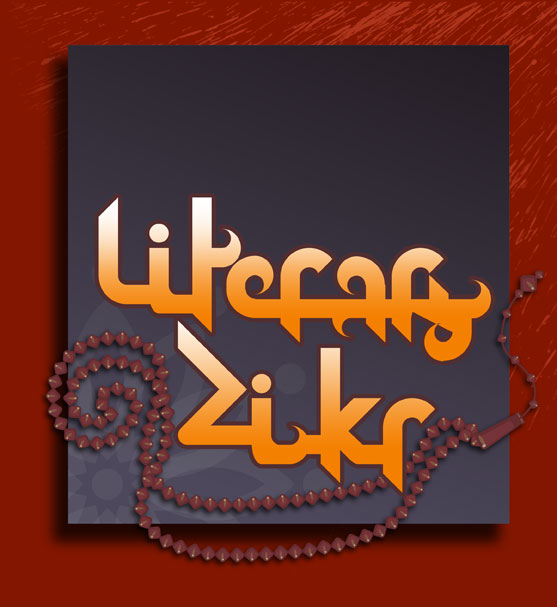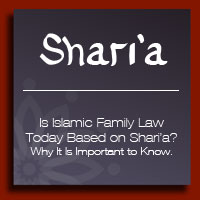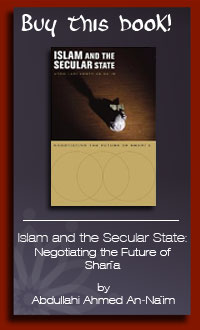





Notes and Definitions of Key Terms
The pronunciation key is intended to give English-speaking readers a close approximation of the word in Arabic. It can not provide a perfect equivalent, however, because some Arabic sounds do not exist in English.
Page: Preface | 1 | 2 | 3 | Notes
Islam
Islam (ih-SLAM) is a monotheistic religion, which teaches that only one God exists. It originated in the Arabian city of Mecca around 610 CE. Muslims see Islam as following from the same monotheistic tradition as Judaism and Christianity. The three religions together are sometimes called Abrahamic faiths, because they trace their history back to the Biblical figure, Abraham(PBUH). According to a 2009 study by the Pew Research Center, Islam is followed by 23% of the world population—over 1.5 billion people.
CE
CE stands for Common Era. It is used with the Gregorian (Christian) calendar. CE is a secular term used instead of AD, which stands for Anno Domini and means "The Year of Our Lord", a Christian-based reference to the birth of Jesus(PBUH).
Prophet Muhammad(PBUH)
Muhammad(PBUH) (mew-HA-med) was the founder of Islam. Muslims believe he was a prophet and messenger of God, following in a long line of prophets dating back to the Biblical figures Noah(PBUH), Abraham(PBUH) and Moses(PBUH). He was born in the city of Mecca and lived roughly between 570 and 632 CE. Initially a merchant, he began receiving divine revelations at the age of 40. To escape persecution, he and his early followers emigrated to the nearby city of Yathrib, which was renamed Medina. Muhammad's name is sometimes spelled in different ways, such as Mohamed.
PBUH
PBUH stands for "peace be upon him." The Arabic equivalent ("SAWS") is sometimes used instead. These phrases are used by Muslims after the name of any prophet, as a way of showing honor and respect.
Allah
Allah (uh-LA) is the Arabic word that refers to the one God worshiped by Muslims. It is also used by Arab Christians. It is not a proper name in the usual sense, but is similar to the English word "God" which uses an upper-case "G" to distinguish it from "god" or "gods." In Arabic, the word Allah is gender neutral (neither masculine nor feminine) and can not be made plural.
Qur'an
The Qur'an (kewr-ANN) is the holy book of Muslims. It is sometimes also written "Koran." The Qur'an is written in poetic form in Arabic. It contains 114 chapters, which vary in length from 3 verses to 286 verses. Muslims believe that the Qur'an was revealed to the Prophet Muhammad(PBUH) in a series of divine revelations between 610 CE and 632 CE. During his lifetime, Muslims memorized all the verses of the Qur'an and began writing them down. After Muhammad(PBUH) died, his followers put the verses of the Qur'an together in one book, in the order they are in now.
Muslims
A Muslim is someone who believes in only one god (God, or Allah) and believes that Muhammad(PBUH) was a messenger, or prophet, of God. In practice, it also means someone who calls him- or herself a Muslim. The plural of Muslim is Muslims.
Hadith
Hadith (ha-DEETH) are stories about what the Prophet Muhammad(PBUH) said and did. They were passed down orally and then written down. These stories are accompanied by isnad (ih-SNAD), a list of narrators—who told the story to whom—going all the way back to the original witness who saw or heard the Prophet Muhammad(PBUH). The isnad allows scholars to evaluate how accurate the story is likely to be.
Ijtihad
Ijtihad is the process of making an educated interpretation of Shari'a. In the Sunni (SUE-nee) tradition, the possibility of reinterpreting Shari'a has been considered "closed" since the 900s CE. Interpretations of Shari'a today are limited to ifta (if-TAH), which generally result in fatwas (FAHT-wahs) that reference earlier rulings by one of the major Sunni schools of thought. In the Shi'a (SHE-ah) tradition, the Jafari school of thought continues to allow ijtihad (ij-tee-HAD).
Madhab
A madhab (MATH-hab, with TH like "than") is an Islamic school of thought, based on the works of early scholars. In the Sunni (SUE-nee) tradition, these include the Hanafi, Maliki, Shafi'i and Hanbali schools of thought. In the Shi'a (SHE-ah) tradition, the most notable is the Jafari school of thought. Other schools of thought exist, such as Ismaili, Zaidi, Ahmadi, and numerous Sufi (SUE-fee) groups. The plural of madhab is madhahib (math-ah-HEEB).
Hanafi
•Founded by Abu Hanifa an-Nu‘man ibn Thābit (699-767 CE).
•One of the first to develop and most widespread.
•Originated in Iraq.
•Was officially supported by the Abbasid Caliphate earlier; and the Ottoman Empire more recently.
•The Hanafi school puts the greatest emphasis on reason.
Maliki
•Founded by Mālik ibn Anas (711-795 CE).
•One of the first to develop and most widespread.
•Grew out of the city of Medina.
•The Maliki school differs from the other schools in giving more consideration to factors beyond the Qur'an and Hadith, such as the rulings of the four caliphs that ruled immediately after Prophet Muhammad(PBUH), the agreement of scholars, and widespread customs.
Shafi'i
•Founded by Abū ‘Abdu l-Lāh Muhammad ibn Idrīs (760-815 CE).
•The founder was born in Gaza, but the madhab is considered to have started in Cairo, where Imam ash-Shafi'i lived in the last years of his life.
•A significant tenet of the Shafi'i school is that hadith should only explain the Quran, but can not contradict it.
Hanbali
•Founded by Ahmad bin Muhammad bin Hanbal ( 780-855 CE).
•The Hanbali school tends to be the most conservative school of Islamic thought.
•Long considered the least popular of Sunni schools, it was revived from near extinction in the late 1700s by Ibn Abdel Wahhab of Arabia. His followers, often called Wahhabis, are the primary followers of the Hanbali school today.
Ja’fari
•Founded by Ja'far ibn Muhammad as-Sādiq (702-765 CE).
•The Ja'fari school is the primary school of thought among today's Shi'ites.
•Ja'faris are also known as Twelvers because they recognize twelve divinely ordained early imams, or religious leaders.
Ismaili
•Founded by Ismā‘īl ibn Ja‘far (721-755 CE).
•Ismailis are a minority among Shi'a today.
•They are also known as Seveners, because they departed from the Twelvers after the seventh imam.
Zaidi
•Founded by Zayd ibn ‘Alī (695-740 CE).
•The Shi'a madhab closest to Sunnis.
•Zaidis are now found mainly in Yemen and southern Arabia.
Madhab Map
Hanafi: Afghanistan, Turkey, Iraq, Syrian, Balkan states, Cyprus, Jordan, Sudan, Israel and Palestine, Egypt (Indian Subcontinent, Afghanistan)
Maliki: Sudan, North Africa (from Libya going west) to all of West Africa and east coast territories of Arabia such as Kuwait
Shafi'i: Malaysia, Indonesia, Singapore, the Philippines, Sri Lanka, Maldives
Hanbali: Saudi Arabia United Arab Emirates
Ja'fari: Mainly Iran and Iraq, some in Syria and Lebanon
Ismaili: India, Pakistan, Syria, Saudi Arabia, Yemen, China, Jordan, Uzbekistan, Tajikistan, Afghanistan, East Africa, Syria, and South Africa
Zaidi: Yemen, southern Arabia
Usul al-Fiqh
Usul al-fiqh (oo-SOOL ahl-FICK) are rules for interpreting the Qur'an and Sunna that were established by Muslim scholars between 700 and 900 CE. For the majority of Muslims, these rules continue to govern how Shari’a is interpreted.
Islamic countries
For the purposes of this text, Prof. An-Na'im defines Islamic countries as those with a majority Muslim population, regardless of the form of government.
Colonization
European powers—especially Britain, France, and the Netherlands—had control of nearly all countries where Muslims are the majority of the population today. The exceptions were Iran, Turkey and Saudi Arabia. In these three countries, there was strong colonial influence, but there was no military conquest or occupation. The period of European colonialism started as early in the 1700s in some places, such as Indonesia (colonized by the Netherlands) and India (colonized by Britain). However, the effect of colonialism was strongest during the 1800s and early 1900s.
Secular
Secular means something that is separate from religion. For example, in many places there are religious holidays (such as Eid al-Fitr, Christmas or Passover) as well as secular holidays (such as New Year's Day or Independence Day).
Caliph
Caliph comes from the khalifa, which means "representative." It is a term that was used for the highest leaders of Islamic government until 1924. The land controlled by a caliph was called a caliphate. Since a caliphate was often a great deal of territory, a governor called an amir (prince) or sultan (authority/ruler) ruled over a smaller area and reported to the caliph.
Al-Khulafa al-Rashidun
The term Al-Khulafa al-Rashidun means "the Rightly-Guided Caliphs". It is a term used by Sunnis to refer to the first four Caliphs (or rulers), who immediately followed the Prophet Muhammad(PBUH) as leaders, ruling from 632 to 661. They were Abu Bakr, Umar, Uthman and Ali. The Shi’a do not accept the first three Caliphs as legitimate. They only recognize Ali and his descendants (from his marriage to Fatima, the daughter of the Prophet PBUH) as rightful Imams and true successors of the Prophet(PBUH).
Colonies
Colonies are areas that are under the control of another independent country. For example, Massachusetts (in the U.S.) and India were both once colonies of Great Britain.
Protectorate
A protectorate is an area that is under the political protection of another independent country. A protectorate usually agrees to certain conditions, which may be minor or may result in virtual control by the other country. For example, Morocco was once a protectorate of France.
Umayyad
The Umayyad (oo-MAY-id) dynasty was established in 661 CE after the assassination of Ali, the fourth Caliph and first Imam of the Shi’a. The Umayyads ruled from Damascus until they were overthrown by the Abbasid’s revolt in 750 CE.
Abbasid
The Abbasid (ah-BAA-sid) Caliphate followed the Umayyad dynasty. It began around 750 CE in Harran. Soon after, it moved the capital to Baghdad. The Abbasid Caliphate moved again to Egypt in the 13th Century and finally was succeeded by the Ottoman Empire in the 1500s. For most of this period, the Abbasid Caliph was a figurehead, while the real rulers were provincial chiefs and military commanders.
Mufti
A mufti (MUF-tee) is a religious scholar who studies Shari'a and early scholars' writings in order to make a ruling, or fatwa (FAHT-wah), on contemporary issues. Ifta (if-TAH) is the process by which a mufti makes a religious ruling, usually based on his own understanding of Shari'a and the interpretations provided by at least one major madhab (MATH-hab, with TH like "than"), or Islamic school of thought. Ifta is different from ijtihad (ij-tee-HAD), as it does not reinterpret Shari'a.
Fatwa
A fatwa (FAHT-wah) is a religious ruling by a religious scholar, or mufti (MUF-tee). In Sunni (SUE-nee) Islam, a fatwa is not considered to be binding on all Sunni Muslims. However, in Shi'a (SHE-ah) Islam, some fatwas may be considered binding.
Token
When two groups want different things, sometimes the group that has more power gives up a small thing to the group with less power. That way, the group with more power seems to be giving power to the other group. Most of the time, though, the thing that is given to the group with less power is something the powerful group does not view as very important. By giving something up—even something small—the group in power hopes to avoid giving up more important things. In that case, the thing that is given is called a "token." In this case, colonial powers often gave up control of family law—and especially women's rights—so that conservative religious groups would not rebel and try to control something they considered important, like trade.
Nation-state
The nation-state is the widely accepted model used by countries around the world today. A nation-state has independent control of its territory and population. It has its own independent political system and clear borders. A “nation” is assumed to have a unified ethnic or cultural identity, but this is not true of most nation-states today.
Islam (ih-SLAM) is a monotheistic religion, which teaches that only one God exists. It originated in the Arabian city of Mecca around 610 CE. Muslims see Islam as following from the same monotheistic tradition as Judaism and Christianity. The three religions together are sometimes called Abrahamic faiths, because they trace their history back to the Biblical figure, Abraham(PBUH). According to a 2009 study by the Pew Research Center, Islam is followed by 23% of the world population—over 1.5 billion people.
CE
CE stands for Common Era. It is used with the Gregorian (Christian) calendar. CE is a secular term used instead of AD, which stands for Anno Domini and means "The Year of Our Lord", a Christian-based reference to the birth of Jesus(PBUH).
Prophet Muhammad(PBUH)
Muhammad(PBUH) (mew-HA-med) was the founder of Islam. Muslims believe he was a prophet and messenger of God, following in a long line of prophets dating back to the Biblical figures Noah(PBUH), Abraham(PBUH) and Moses(PBUH). He was born in the city of Mecca and lived roughly between 570 and 632 CE. Initially a merchant, he began receiving divine revelations at the age of 40. To escape persecution, he and his early followers emigrated to the nearby city of Yathrib, which was renamed Medina. Muhammad's name is sometimes spelled in different ways, such as Mohamed.
PBUH
PBUH stands for "peace be upon him." The Arabic equivalent ("SAWS") is sometimes used instead. These phrases are used by Muslims after the name of any prophet, as a way of showing honor and respect.
Allah
Allah (uh-LA) is the Arabic word that refers to the one God worshiped by Muslims. It is also used by Arab Christians. It is not a proper name in the usual sense, but is similar to the English word "God" which uses an upper-case "G" to distinguish it from "god" or "gods." In Arabic, the word Allah is gender neutral (neither masculine nor feminine) and can not be made plural.
Qur'an
The Qur'an (kewr-ANN) is the holy book of Muslims. It is sometimes also written "Koran." The Qur'an is written in poetic form in Arabic. It contains 114 chapters, which vary in length from 3 verses to 286 verses. Muslims believe that the Qur'an was revealed to the Prophet Muhammad(PBUH) in a series of divine revelations between 610 CE and 632 CE. During his lifetime, Muslims memorized all the verses of the Qur'an and began writing them down. After Muhammad(PBUH) died, his followers put the verses of the Qur'an together in one book, in the order they are in now.
Muslims
A Muslim is someone who believes in only one god (God, or Allah) and believes that Muhammad(PBUH) was a messenger, or prophet, of God. In practice, it also means someone who calls him- or herself a Muslim. The plural of Muslim is Muslims.
Hadith
Hadith (ha-DEETH) are stories about what the Prophet Muhammad(PBUH) said and did. They were passed down orally and then written down. These stories are accompanied by isnad (ih-SNAD), a list of narrators—who told the story to whom—going all the way back to the original witness who saw or heard the Prophet Muhammad(PBUH). The isnad allows scholars to evaluate how accurate the story is likely to be.
Ijtihad
Ijtihad is the process of making an educated interpretation of Shari'a. In the Sunni (SUE-nee) tradition, the possibility of reinterpreting Shari'a has been considered "closed" since the 900s CE. Interpretations of Shari'a today are limited to ifta (if-TAH), which generally result in fatwas (FAHT-wahs) that reference earlier rulings by one of the major Sunni schools of thought. In the Shi'a (SHE-ah) tradition, the Jafari school of thought continues to allow ijtihad (ij-tee-HAD).
Madhab
A madhab (MATH-hab, with TH like "than") is an Islamic school of thought, based on the works of early scholars. In the Sunni (SUE-nee) tradition, these include the Hanafi, Maliki, Shafi'i and Hanbali schools of thought. In the Shi'a (SHE-ah) tradition, the most notable is the Jafari school of thought. Other schools of thought exist, such as Ismaili, Zaidi, Ahmadi, and numerous Sufi (SUE-fee) groups. The plural of madhab is madhahib (math-ah-HEEB).
Hanafi
•Founded by Abu Hanifa an-Nu‘man ibn Thābit (699-767 CE).
•One of the first to develop and most widespread.
•Originated in Iraq.
•Was officially supported by the Abbasid Caliphate earlier; and the Ottoman Empire more recently.
•The Hanafi school puts the greatest emphasis on reason.
Maliki
•Founded by Mālik ibn Anas (711-795 CE).
•One of the first to develop and most widespread.
•Grew out of the city of Medina.
•The Maliki school differs from the other schools in giving more consideration to factors beyond the Qur'an and Hadith, such as the rulings of the four caliphs that ruled immediately after Prophet Muhammad(PBUH), the agreement of scholars, and widespread customs.
Shafi'i
•Founded by Abū ‘Abdu l-Lāh Muhammad ibn Idrīs (760-815 CE).
•The founder was born in Gaza, but the madhab is considered to have started in Cairo, where Imam ash-Shafi'i lived in the last years of his life.
•A significant tenet of the Shafi'i school is that hadith should only explain the Quran, but can not contradict it.
Hanbali
•Founded by Ahmad bin Muhammad bin Hanbal ( 780-855 CE).
•The Hanbali school tends to be the most conservative school of Islamic thought.
•Long considered the least popular of Sunni schools, it was revived from near extinction in the late 1700s by Ibn Abdel Wahhab of Arabia. His followers, often called Wahhabis, are the primary followers of the Hanbali school today.
Ja’fari
•Founded by Ja'far ibn Muhammad as-Sādiq (702-765 CE).
•The Ja'fari school is the primary school of thought among today's Shi'ites.
•Ja'faris are also known as Twelvers because they recognize twelve divinely ordained early imams, or religious leaders.
Ismaili
•Founded by Ismā‘īl ibn Ja‘far (721-755 CE).
•Ismailis are a minority among Shi'a today.
•They are also known as Seveners, because they departed from the Twelvers after the seventh imam.
Zaidi
•Founded by Zayd ibn ‘Alī (695-740 CE).
•The Shi'a madhab closest to Sunnis.
•Zaidis are now found mainly in Yemen and southern Arabia.
Madhab Map
Hanafi: Afghanistan, Turkey, Iraq, Syrian, Balkan states, Cyprus, Jordan, Sudan, Israel and Palestine, Egypt (Indian Subcontinent, Afghanistan)
Maliki: Sudan, North Africa (from Libya going west) to all of West Africa and east coast territories of Arabia such as Kuwait
Shafi'i: Malaysia, Indonesia, Singapore, the Philippines, Sri Lanka, Maldives
Hanbali: Saudi Arabia United Arab Emirates
Ja'fari: Mainly Iran and Iraq, some in Syria and Lebanon
Ismaili: India, Pakistan, Syria, Saudi Arabia, Yemen, China, Jordan, Uzbekistan, Tajikistan, Afghanistan, East Africa, Syria, and South Africa
Zaidi: Yemen, southern Arabia
Usul al-Fiqh
Usul al-fiqh (oo-SOOL ahl-FICK) are rules for interpreting the Qur'an and Sunna that were established by Muslim scholars between 700 and 900 CE. For the majority of Muslims, these rules continue to govern how Shari’a is interpreted.
Islamic countries
For the purposes of this text, Prof. An-Na'im defines Islamic countries as those with a majority Muslim population, regardless of the form of government.
Colonization
European powers—especially Britain, France, and the Netherlands—had control of nearly all countries where Muslims are the majority of the population today. The exceptions were Iran, Turkey and Saudi Arabia. In these three countries, there was strong colonial influence, but there was no military conquest or occupation. The period of European colonialism started as early in the 1700s in some places, such as Indonesia (colonized by the Netherlands) and India (colonized by Britain). However, the effect of colonialism was strongest during the 1800s and early 1900s.
Secular
Secular means something that is separate from religion. For example, in many places there are religious holidays (such as Eid al-Fitr, Christmas or Passover) as well as secular holidays (such as New Year's Day or Independence Day).
Caliph
Caliph comes from the khalifa, which means "representative." It is a term that was used for the highest leaders of Islamic government until 1924. The land controlled by a caliph was called a caliphate. Since a caliphate was often a great deal of territory, a governor called an amir (prince) or sultan (authority/ruler) ruled over a smaller area and reported to the caliph.
Al-Khulafa al-Rashidun
The term Al-Khulafa al-Rashidun means "the Rightly-Guided Caliphs". It is a term used by Sunnis to refer to the first four Caliphs (or rulers), who immediately followed the Prophet Muhammad(PBUH) as leaders, ruling from 632 to 661. They were Abu Bakr, Umar, Uthman and Ali. The Shi’a do not accept the first three Caliphs as legitimate. They only recognize Ali and his descendants (from his marriage to Fatima, the daughter of the Prophet PBUH) as rightful Imams and true successors of the Prophet(PBUH).
Colonies
Colonies are areas that are under the control of another independent country. For example, Massachusetts (in the U.S.) and India were both once colonies of Great Britain.
Protectorate
A protectorate is an area that is under the political protection of another independent country. A protectorate usually agrees to certain conditions, which may be minor or may result in virtual control by the other country. For example, Morocco was once a protectorate of France.
Umayyad
The Umayyad (oo-MAY-id) dynasty was established in 661 CE after the assassination of Ali, the fourth Caliph and first Imam of the Shi’a. The Umayyads ruled from Damascus until they were overthrown by the Abbasid’s revolt in 750 CE.
Abbasid
The Abbasid (ah-BAA-sid) Caliphate followed the Umayyad dynasty. It began around 750 CE in Harran. Soon after, it moved the capital to Baghdad. The Abbasid Caliphate moved again to Egypt in the 13th Century and finally was succeeded by the Ottoman Empire in the 1500s. For most of this period, the Abbasid Caliph was a figurehead, while the real rulers were provincial chiefs and military commanders.
Mufti
A mufti (MUF-tee) is a religious scholar who studies Shari'a and early scholars' writings in order to make a ruling, or fatwa (FAHT-wah), on contemporary issues. Ifta (if-TAH) is the process by which a mufti makes a religious ruling, usually based on his own understanding of Shari'a and the interpretations provided by at least one major madhab (MATH-hab, with TH like "than"), or Islamic school of thought. Ifta is different from ijtihad (ij-tee-HAD), as it does not reinterpret Shari'a.
Fatwa
A fatwa (FAHT-wah) is a religious ruling by a religious scholar, or mufti (MUF-tee). In Sunni (SUE-nee) Islam, a fatwa is not considered to be binding on all Sunni Muslims. However, in Shi'a (SHE-ah) Islam, some fatwas may be considered binding.
Token
When two groups want different things, sometimes the group that has more power gives up a small thing to the group with less power. That way, the group with more power seems to be giving power to the other group. Most of the time, though, the thing that is given to the group with less power is something the powerful group does not view as very important. By giving something up—even something small—the group in power hopes to avoid giving up more important things. In that case, the thing that is given is called a "token." In this case, colonial powers often gave up control of family law—and especially women's rights—so that conservative religious groups would not rebel and try to control something they considered important, like trade.
Nation-state
The nation-state is the widely accepted model used by countries around the world today. A nation-state has independent control of its territory and population. It has its own independent political system and clear borders. A “nation” is assumed to have a unified ethnic or cultural identity, but this is not true of most nation-states today.
